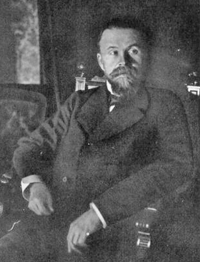(remove inuse tag) |
(+ Cat) |
||
| (5 intermediate revisions by 2 users not shown) | |||
| Line 1: | Line 1: | ||
| − | [[Image:CarlWernicke.gif|right|150px|Carl Wernicke in his study]]'''Carl Wernicke''' was a [[Germany|German]] [[neurology|neurologist]] who in 1874 first described a region of the brain associated with the comprehension of spoken language. This portion of the brain is now known as [[Wernicke's area]] in his honor<ref>http://findarticles.com/p/articles/mi_g2699/is_0006/ai_2699000652</ref> | + | [[Image:CarlWernicke.gif|right|150px|frame|Carl Wernicke in his study]]'''Carl Wernicke''' was a [[Germany|German]] [[neurology|neurologist]] who in 1874 first described a region of the brain associated with the comprehension of spoken language. This portion of the brain is now known as [[Wernicke's area]] in his honor.<ref>http://findarticles.com/p/articles/mi_g2699/is_0006/ai_2699000652</ref> |
| − | Following [[France|French]] | + | Following [[France|French]] neuroanatomist Paul Broca's publication of his findings on [[language]] deficits caused by damage to the frontal lobe area of the brain now known as Broca's area, Wernicke began pursuing his own research into the effects of brain disease on [[speech]] and [[language]]. Wernicke discovered that damage to the left posterior region of the brain resulted in deficits in language comprehension. In 1874 at the age of 26, he published his results in ''The Aphasic Symptom Complex'' a book which propelled him to international fame.<ref>http://www.uic.edu/depts/mcne/founders/page0101.html</ref> |
| − | Wernicke died June 15, 1905, [[Dörrberg im Geratal]], Thüringer Wald, Germany following injuries received in a [[bicycle]] accident<ref>http://www.whonamedit.com/doctor.cfm/927.html</ref> | + | Later, Wernicke also described a [[pain]]ful psychogenic [[muscle]] [[cramp]] precipitated by [[anxiety]] or [[fear]] which became known as [[Wernicke's cramp]].<ref>http://www.whonamedit.com/synd.cfm/889.html</ref> Further research documented [[Wernicke's disease]]. |
| + | |||
| + | Wernicke died June 15, 1905, [[Dörrberg im Geratal]], Thüringer Wald, Germany following injuries received in a [[bicycle]] accident.<ref>http://www.whonamedit.com/doctor.cfm/927.html</ref> | ||
==Notes & references== | ==Notes & references== | ||
<references/> | <references/> | ||
| + | |||
| + | {{DEFAULTSORT:Wernicke, Carl}} | ||
[[Category:Scientists]] | [[Category:Scientists]] | ||
| − | + | [[Category:German People]] | |
Latest revision as of 10:42, April 29, 2017
Following French neuroanatomist Paul Broca's publication of his findings on language deficits caused by damage to the frontal lobe area of the brain now known as Broca's area, Wernicke began pursuing his own research into the effects of brain disease on speech and language. Wernicke discovered that damage to the left posterior region of the brain resulted in deficits in language comprehension. In 1874 at the age of 26, he published his results in The Aphasic Symptom Complex a book which propelled him to international fame.[2]
Later, Wernicke also described a painful psychogenic muscle cramp precipitated by anxiety or fear which became known as Wernicke's cramp.[3] Further research documented Wernicke's disease.
Wernicke died June 15, 1905, Dörrberg im Geratal, Thüringer Wald, Germany following injuries received in a bicycle accident.[4]
